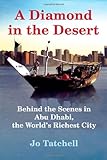
A Diamond in the Desert: Behind the Scenes in Abu Dhabi, the World’s Richest City
Jo Tatchell
Grove Press, Black Cat, 304 pages
October, 2010
Read the first chapter for free >> or Buy the book from Amazon >>
Description (from Publishers Weekly):
A glittering emblem of global modernity carries a tinge of tribal clannishness and xenophobia in this revealing travelogue through the capital of the United Arab Emirates. Tatchell (The Poet of Baghdad), an English journalist who spent her youth in Abu Dhabi, compares the present city, with its skyscrapers, lavish malls, and Guggenheim branch, to the bedouin past it has all but obliterated. She finds that Abu Dhabi’s 420,000 official citizens, with an average net worth of million in oil wealth, have traded their camels and tents for SUVs, condos, and glitzy, indolent jet-setting; surrounding them is a sea of exploited foreign guest workers, 80% of the population, who build and run the city while living in a stateless limbo. (There are secrets lurking behind the shopping and partying, she finds during a Kafkaesque quest to locate the national newspaper archive.) The author’s teeming, sharply etched portrait introduces readers to tycoons, a wastrel playboy with a pet panther, a bored housewife trying to score bootleg liquor, avant-garde artists, nostalgic British expats, and a Lithuanian prostitute. Tatchell’s keen powers of observation and personal connections enable her to convey the hidden reality of this mirage-like city.
I don’t know what the best under eye cream might be, but I do know that the best way to get a free pedicure is to walk barefoot in sand, and speaking of sand, there’s a great moment in Jo Tatchell’s memoir A Diamond in the Desert: Behind the Scenes in Abu Dhabi, the World’s Richest City where Jo, visiting her childhood hometown as an adult, finds that she misses the desert sands that have been supplanted by modern construction. She sees some sand between a couple of buildings and takes off her shoes so she can feel it on her feet. It wasn’t a huge moment, but it’s the kind of detail and emotional connection that is what makes this book so delightful on so many levels.
But I digress.
When Ms. Tatchell contacted me and offered me a copy to review, I didn’t connect her name with the voice I’ve heard from my radio when she’s been on NPR, and I’m glad of that, because I would have been slightly intimidated. Who am I to review her work? I confess, I also felt a bit inadequate. I read a lot; I try to keep myself aware of the goings on in the world outside the bubble of SEO copywriting and improvisational comedy in which I reside, but the history of the Arab world is so rich and complicated that I don’t feel I have an accurate grasp on it.
Despite this, or maybe because of it, I quickly found myself engrossed in Tatchell’s book. As many reviewers have said, it’s part memoir, part travelogue, part history, but it’s also a completely human story. In many ways, it’s also a twist on the whole “you can’t go home again” theme, because Tatchell did spend part of her childhood living in Abu Dhabi in the 1970s at the dawn of OPEC (which period I really only knew through works of fiction like The Eight before reading this book). Going back to any childhood home as an adult makes us see it with new eyes. Things we thought were huge often seem diminished, things we remember as sparkly and new often seem dingy and faded, or, conversely, things we remember as worn down are likely to greet us in new, gentrified forms.
Beyond the homecoming aspect of A Diamond in the Desert, however, there is also a look at modern Arab culture that most Westerners will never really experience, and it’s shared candidly, without any political agenda. Tatchell’s observations are honest ones. She sees the changes in “her” city, both good and bad. Abu Dhabi, after all, is one of the few Arab countries with a decidedly pro-Western stance, modeling a form of tolerance we could learn from , and demonstrating that cultural evolution is possible, and even necessary, in a world so full of dynamic change.
Not that Abu Dhabi is perfect, of course. Tatchell never implies that it is, and she shows us its faults as well . In everything from the glossing over, nay, the total erasure of a child abduction that happened in her youth, to the careful non-existence of newspaper archives from the same period, to her recollection of a party she attended as a young woman where the host kept a panther on the balcony (I felt bad for the panther), she shows us Abu Dhabi as naked as a city can be under the cloak of civilization all cities wear.
Tatchell may not love Abu Dhabi unconditionally, but her respect for the city, the country, the culture all shine through. She shows us a different life, and while she may comment on apparent social and/or political inequities (women, for example, are still not treated as equals there, but then, we Westerners aren’t exactly enlightened about the treatment of women (or GLBTQQI folks, or ethnic minorities, or, or, or…) either. We just cover it better.) she does so without harsh judgement.
If you want a scandalous story about murder and crime and intrigue, this is not the book for you. If, on the other hand, you want an honest glimpse behind the veil of culture, with hints of intrigue and peeks at darker politics, as told from someone who has lived in the culture, you should race to the bookstore or click on one of the links above, and buy this book today. You won’t regret it.
And you might even learn something.
I know I did.
Goes well with mint tea and chicken shawarma.
